Deck 15: Programming Timers
Question
Question
Question
Question
Question
Question
Question
Question
Question
Question
Question
Question
Question
Question
Question
Question
Question
Question
Question
Question
Question
Question
Question

Unlock Deck
Sign up to unlock the cards in this deck!
Unlock Deck
Unlock Deck
1/23
Play
Full screen (f)
Deck 15: Programming Timers
1
The timer's delay time would equal the value in the ACC multiplied by the time base.
False
2
For the timer structure shown, which member indicates that a timing operation is in process? 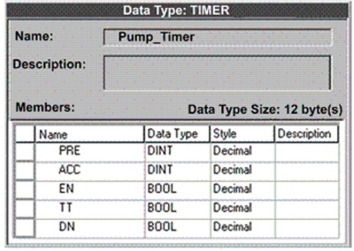
A)PRE
B)ACC
C)DN
D)TT

A)PRE
B)ACC
C)DN
D)TT
TT
3
For timer structure shown, which member specifies the value the timer must accumulate to reach the desired time delay? 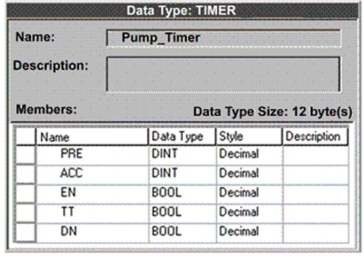
A)PRE
B)EN
C)ACC
D)TT

A)PRE
B)EN
C)ACC
D)TT
PRE
4
Which instruction can best be used to turn an output coil on or off after the rung has been false for a desired time?
A)RTO
B)TOF
C)TON
D)TONF
A)RTO
B)TOF
C)TON
D)TONF

Unlock Deck
Unlock for access to all 23 flashcards in this deck.
Unlock Deck
k this deck
5
The timer off-delay (TOF) instruction can be used to turn an output coil on or off after the rung has been false for a desired time.

Unlock Deck
Unlock for access to all 23 flashcards in this deck.
Unlock Deck
k this deck
6
The TON instruction produces an off-delay timer.

Unlock Deck
Unlock for access to all 23 flashcards in this deck.
Unlock Deck
k this deck
7
For the timer structure shown, which member indicates that accumulated value is equal to the preset value? 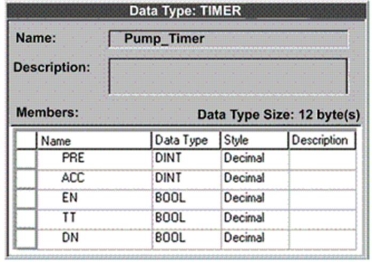
A)PRE
B)EN
C)DN
D)TT

A)PRE
B)EN
C)DN
D)TT

Unlock Deck
Unlock for access to all 23 flashcards in this deck.
Unlock Deck
k this deck
8
Timers are used to:
A)turn outputs on and off after a time delay.
B)turn outputs on or off for a set amount of time.
C)keep track of the time an output is on or off.
D)all of these.
A)turn outputs on and off after a time delay.
B)turn outputs on or off for a set amount of time.
C)keep track of the time an output is on or off.
D)all of these.

Unlock Deck
Unlock for access to all 23 flashcards in this deck.
Unlock Deck
k this deck
9
The timer address in the ControlLogix controller is a predefined structure of the TIMER data type.

Unlock Deck
Unlock for access to all 23 flashcards in this deck.
Unlock Deck
k this deck
10
The RES instruction is used to reset a timer's accumulated value.

Unlock Deck
Unlock for access to all 23 flashcards in this deck.
Unlock Deck
k this deck
11
The delay time of the timer shown would be: 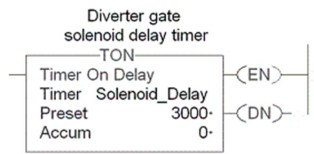
A)3000 seconds.
B)300 seconds.
C)30 seconds.
D)3 seconds.

A)3000 seconds.
B)300 seconds.
C)30 seconds.
D)3 seconds.

Unlock Deck
Unlock for access to all 23 flashcards in this deck.
Unlock Deck
k this deck
12
A TOF timer starts to accumulate time when the rung:
A)makes a true to false transition.
B)makes a false to true transition.
C)when the done bit is set to 1.
D)when the done bit is reset to 0.
A)makes a true to false transition.
B)makes a false to true transition.
C)when the done bit is set to 1.
D)when the done bit is reset to 0.

Unlock Deck
Unlock for access to all 23 flashcards in this deck.
Unlock Deck
k this deck
13
A TON timer begins accumulating time when the rung conditions become true.

Unlock Deck
Unlock for access to all 23 flashcards in this deck.
Unlock Deck
k this deck
14
The timer tag name for the timer shown is: 
A)TOF.
B)Timer.
C)Sample.
D)Sample_TOF.

A)TOF.
B)Timer.
C)Sample.
D)Sample_TOF.

Unlock Deck
Unlock for access to all 23 flashcards in this deck.
Unlock Deck
k this deck
15
A TOF timer begins accumulating time when the rung conditions become true.

Unlock Deck
Unlock for access to all 23 flashcards in this deck.
Unlock Deck
k this deck
16
The time increment used in CLX timers is milliseconds.

Unlock Deck
Unlock for access to all 23 flashcards in this deck.
Unlock Deck
k this deck
17
A TOF timer starts to accumulate time:
A)when the rung makes a true to false transition.
B)when the rung makes a false to true transition.
C)when the done bit is set to 1.
D)when the done bit is reset to 0.
A)when the rung makes a true to false transition.
B)when the rung makes a false to true transition.
C)when the done bit is set to 1.
D)when the done bit is reset to 0.

Unlock Deck
Unlock for access to all 23 flashcards in this deck.
Unlock Deck
k this deck
18
The on-delay timer (TON) is a retentive timer.

Unlock Deck
Unlock for access to all 23 flashcards in this deck.
Unlock Deck
k this deck
19
Retentive timers lose the accumulated time every time the rung condition becomes false.

Unlock Deck
Unlock for access to all 23 flashcards in this deck.
Unlock Deck
k this deck
20
The timer tag name for the timer shown is: 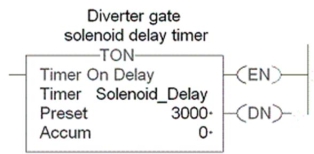
A)Diverter gate solenoid delay timer.
B)Timer.
C)Solenoid_Delay.
D)either a or c.

A)Diverter gate solenoid delay timer.
B)Timer.
C)Solenoid_Delay.
D)either a or c.

Unlock Deck
Unlock for access to all 23 flashcards in this deck.
Unlock Deck
k this deck
21
The delay time for the timer shown would be: 
A)5000 milliseconds.
B)500 milliseconds.
C)50 milliseconds.
D)5 milliseconds.

A)5000 milliseconds.
B)500 milliseconds.
C)50 milliseconds.
D)5 milliseconds.

Unlock Deck
Unlock for access to all 23 flashcards in this deck.
Unlock Deck
k this deck
22
The RTO timer's ACC value is reset to zero by a:
A)RES instruction with a different tag name.
B)RES instruction with the same tag name.
C)true to false transition of the timer rung.
D)false to true transition of the timer rung.
A)RES instruction with a different tag name.
B)RES instruction with the same tag name.
C)true to false transition of the timer rung.
D)false to true transition of the timer rung.

Unlock Deck
Unlock for access to all 23 flashcards in this deck.
Unlock Deck
k this deck
23
A RTO retentive on-delay timer retains its ACC value even if:
A)the rung goes false.
B)the processor is placed in the program mode.
C)power to the processor is temporarily interrupted.
D)all of these.
A)the rung goes false.
B)the processor is placed in the program mode.
C)power to the processor is temporarily interrupted.
D)all of these.

Unlock Deck
Unlock for access to all 23 flashcards in this deck.
Unlock Deck
k this deck



